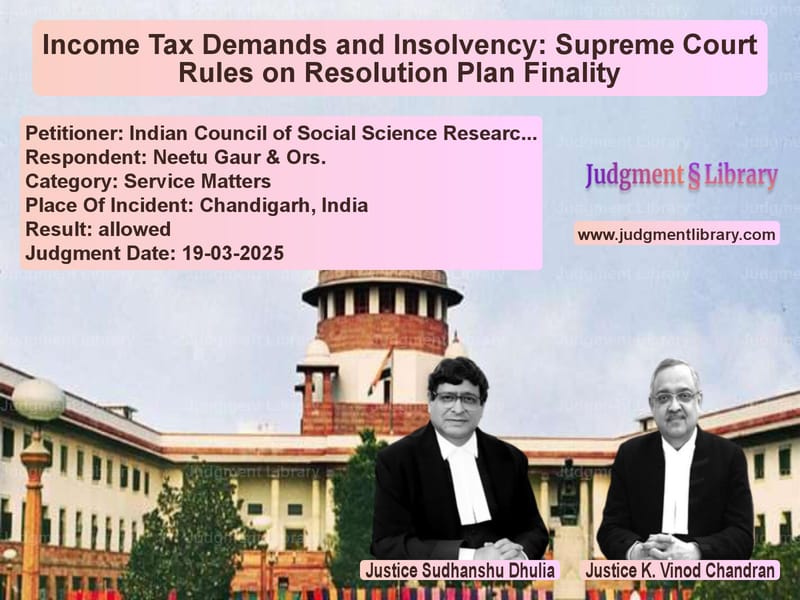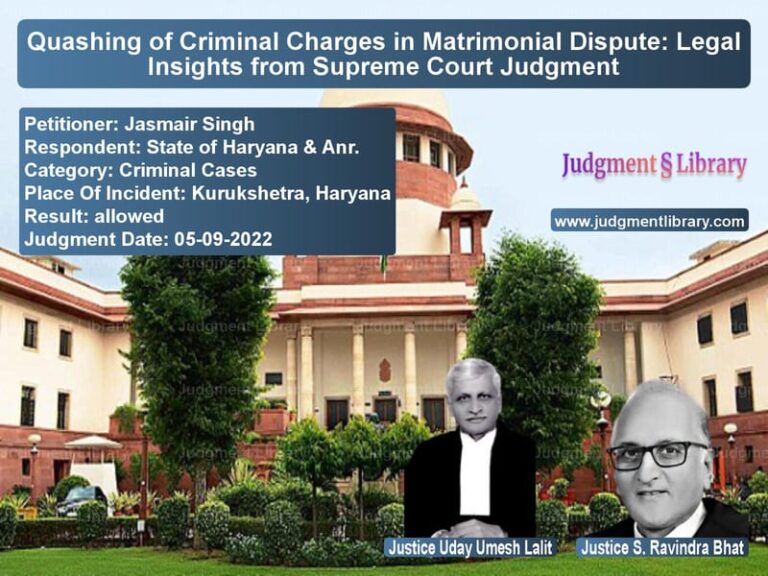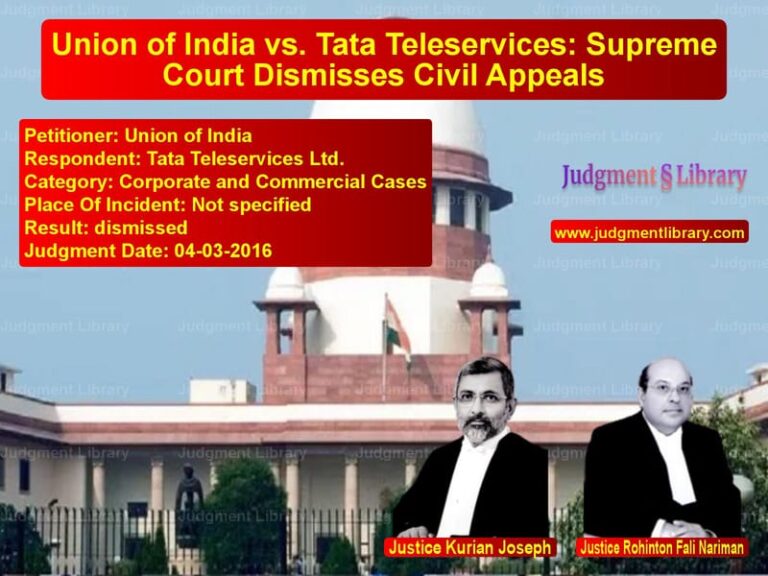Income Tax Demands and Insolvency: Supreme Court Rules on Resolution Plan Finality
The Supreme Court of India recently delivered a crucial ruling in the case of Vaibhav Goel & Anr. vs. Deputy Commissioner of Income Tax & Anr., addressing whether the Income Tax Department could raise fresh tax demands against a company after the approval of its insolvency resolution plan. The Court held that all statutory dues not included in the approved resolution plan stand extinguished, providing much-needed clarity for corporate debtors undergoing insolvency proceedings.
The case primarily revolved around the claims of the Income Tax Department regarding unpaid tax dues of M/s. Tehri Iron and Steel Casting Ltd. (the Corporate Debtor). The department sought to enforce tax liabilities that had not been submitted before the Resolution Professional during the insolvency process. The judgment, which follows precedents set in Ghanashyam Mishra and Sons Pvt. Ltd. vs. Edelweiss Asset Reconstruction Co. and Committee of Creditors of Essar Steel India Ltd. vs. Satish Kumar Gupta, reinforces the principle that once a resolution plan is approved, all unclaimed dues are extinguished.
Background of the Case
The dispute originated from the Corporate Insolvency Resolution Process (CIRP) initiated against M/s. Tehri Iron and Steel Casting Ltd. under the Insolvency and Bankruptcy Code, 2016 (IBC). The appellants, who were joint resolution applicants, had submitted a resolution plan in 2019, which was approved by the National Company Law Tribunal (NCLT) on May 21, 2019.
Read also: https://judgmentlibrary.com/icssr-grant-dispute-supreme-court-rules-on-financial-control-over-crrid/
The resolution plan recognized certain liabilities, including a contingent liability of Rs. 16.85 crores for the assessment year 2014-15. However, the Income Tax Department did not file claims for the assessment years 2012-13 and 2013-14 before the Resolution Professional. Despite this, the department later issued fresh demand notices in December 2019, attempting to recover outstanding dues.
Legal Proceedings
At the NCLT Level
- The Resolution Professional, upon receiving the fresh tax demands, filed an application before the NCLT, seeking to have the claims invalidated.
- The NCLT dismissed the application, labeling it as frivolous and imposed a cost of Rs. 1 lakh on the appellants.
At the NCLAT Level
- The appellants challenged the NCLT’s order before the National Company Law Appellate Tribunal (NCLAT).
- The NCLAT dismissed the appeal, holding that tax authorities were entitled to pursue statutory dues despite the approved resolution plan.
- The tribunal also reasoned that the Supreme Court’s ruling in Ghanashyam Mishra was not applicable as it had not been cited before the NCLT.
Supreme Court’s Observations and Judgment
On appeal, the Supreme Court unequivocally ruled in favor of the appellants, setting aside the decisions of both the NCLT and NCLAT. The Court made several key observations:
“A funding agency cannot be held accountable for financial mismanagement of an autonomous institution. Granting funds does not equate to administrative control.”
“The mere presence of financial oversight by ICSSR does not imply legal responsibility for salary payments of CRRID employees.”
“If an institution fails to manage its finances properly, the liability lies with the institution itself, not the grant provider.”
Most Important Verbatim Arguments from the Judgment
“ICSSR’s role as a grant-giving body does not extend to the direct management or administration of CRRID. The institution is responsible for ensuring compliance with funding conditions.”
“Merely because an institution is dependent on government grants does not make the funding body its employer or administrator.”
“When funding is withdrawn due to violations, the affected institution must take corrective measures rather than seeking continued financial aid without compliance.”
Final Judgment and Conclusion
- The Supreme Court set aside the High Court ruling, stating that ICSSR was not obligated to pay CRRID employees.
- The Court reaffirmed that funding agencies do not assume employer responsibilities.
- CRRID was directed to manage salary payments from its own financial resources.
- The Court advised institutions to ensure financial accountability to avoid similar disputes in the future.
This judgment reinforces that grant-giving bodies cannot be forced into employer-like obligations unless expressly stated in law or agreements. The ruling provides clarity on the limits of financial control and ensures institutions remain accountable for their administrative responsibilities.
Petitioner Name: Indian Council of Social Science Research (ICSSR).Respondent Name: Neetu Gaur & Ors..Judgment By: Justice Sudhanshu Dhulia, Justice K. Vinod Chandran.Place Of Incident: Chandigarh, India.Judgment Date: 19-03-2025.
Don’t miss out on the full details! Download the complete judgment in PDF format below and gain valuable insights instantly!
Download Judgment: indian-council-of-so-vs-neetu-gaur-&-ors.-supreme-court-of-india-judgment-dated-19-03-2025.pdf
Directly Download Judgment: Directly download this Judgment
See all petitions in Employment Disputes
See all petitions in Public Sector Employees
See all petitions in Recruitment Policies
See all petitions in Termination Cases
See all petitions in Judgment by Sudhanshu Dhulia
See all petitions in Judgment by K. Vinod Chandran
See all petitions in allowed
See all petitions in supreme court of India judgments March 2025
See all petitions in 2025 judgments
See all posts in Service Matters Category
See all allowed petitions in Service Matters Category
See all Dismissed petitions in Service Matters Category
See all partially allowed petitions in Service Matters Category







